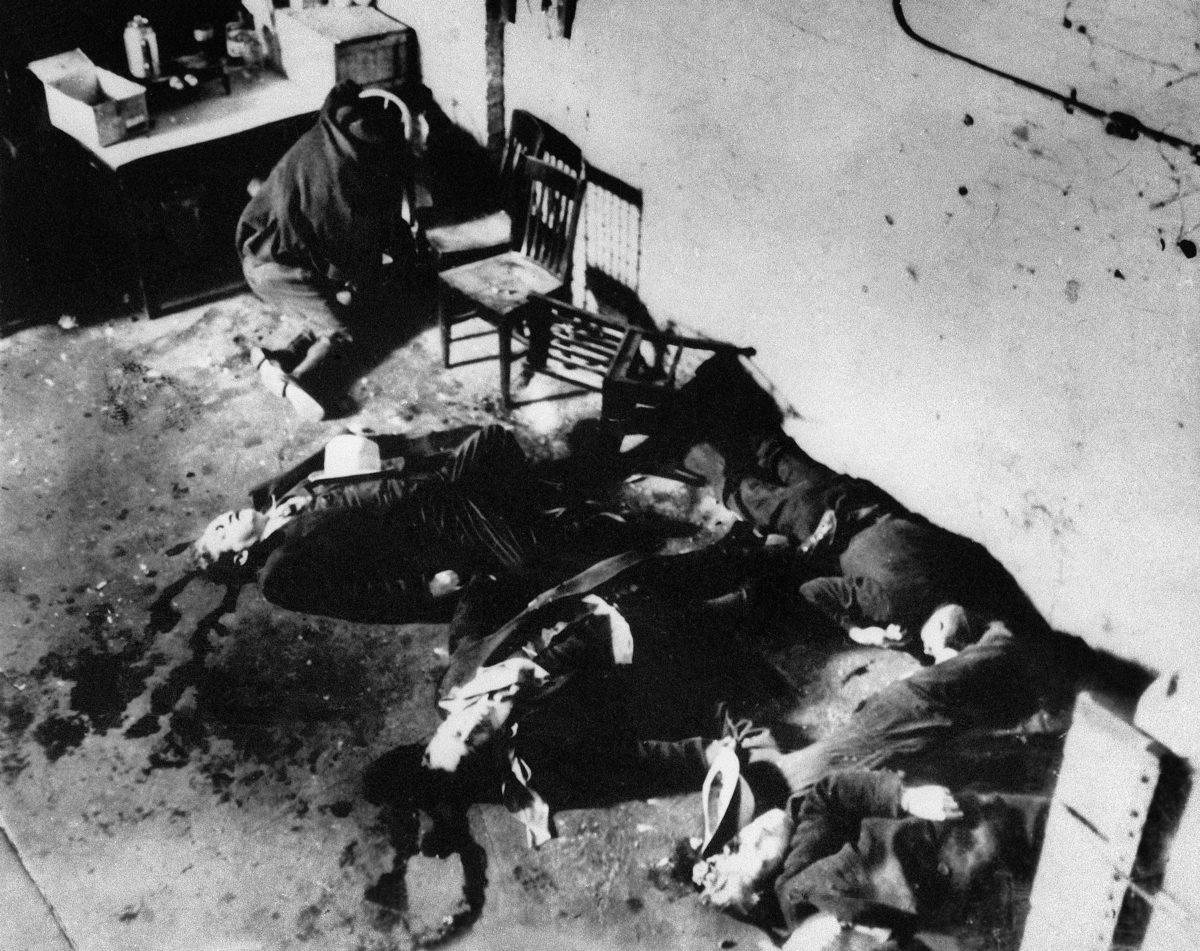
Oh, Chicago! A Look At Crime Rates In The Windy City With Bail Reform About To Be Reality
By Deepti Govind
When David Mamet wrote the screenplay for The Untouchables, he wrote in a dialogue for one of the lead characters that became very popular: “You wanna know how to get Capone? They pull a knife, you pull a gun. He sends one of yours to the hospital, you send one of his to the morgue. That’s the Chicago way! And that’s how you get Capone.”
Yes, these famous lines — uttered by Jimmy Malone, played in an Oscar-winning performance by the late Sean Connery, in conversation with Kevin Costner’s famed Elliot Ness — are purely fictional. But the feeling the lines evoke, overall, is one of awareness of just how serious an issue violent crime had become in Chicago almost a century ago.
That, unfortunately, still holds true, but some things are changing. Last month, the Illinois legislature passed HB 3653 SFA2, known as the Illinois Pretrial Fairness Act, as part of a comprehensive criminal justice reforms package. It was sent to Illinois Gov. J.B. Pritzker on Feb. 4, 2021, and is expected to be signed into law by him.
The act, more than 300 pages long, not only abolishes the controversial cash bond system by 2023 — it would make Illinois the first state to completely eliminate money bail, making sure that people accused of crimes don’t await trial in jail just because they can’t afford bond — but also aims to end mass pretrial incarceration.
Then, at the beginning of February, 2021, the Justice Department confirmed that its violent crime-fighting program — Operation Legend — was canceled, ABC7 Chicago reported. The federal law enforcement program had specifically targeted rising violence in major American cities.
A project of then-Attorney General William Barr, it was named after LeGend Taliferro, a 4-year-old who was murdered while sleeping in his Kansas City home by a bullet meant for someone else, early on the morning of June 29, 2020. Operation Legend was greeted with mixed reactions from local mayors and community groups, ostensibly more because of the politics of it all than any debate over a need to solve the problem of rising violent crime. Everyone agreed about that. Even in Chicago.
In any case, according to the yearend figures for the program in Chicago, 176 people were charged through Operation Legend, including 40 on drug counts and 130 for firearms-related violations.
According to the DOJ, between Operation Legend’s July 8, 2020 launch in Kansas City and subsequent expansion to 8 more cities — Chicago, Albuquerque, Cleveland, Detroit, Milwaukee, St. Louis, Memphis and Indianapolis — federal agencies and local law enforcement had made more than 6,000 arrests overall by December-end. This included approximately 467 arrests for homicide, the seizure of more than 2,600 firearms, more than 32 kilos of heroin, 17-plus kilos of fentanyl, 300-plus kilos of methamphetamine, more than 135 kilos of cocaine, and more than $11 million in drug and other illicit proceeds.
Of the more than 6,000 individuals arrested, around 1,500 were charged with federal offenses, with 815 defendants specifically charged with firearms offenses.
“I say it was very successful across the country, there were approximately 6,000 subjects that were arrested, and we’re talking about the repeat offenders,” Assistant Special Agent in Charge of Chicago’s FBI office, Clifford Swindell, is cited as saying in the ABC7 report.
Do Recent Numbers Tell The Real Story?
On the face of it, the overall number of crimes do appear to be on the decline in Chicago in recent weeks. Sample the graphic below, which shows that most categories of criminal complaints were down in the city over the week of Feb.1 to Feb. 7, 2021.
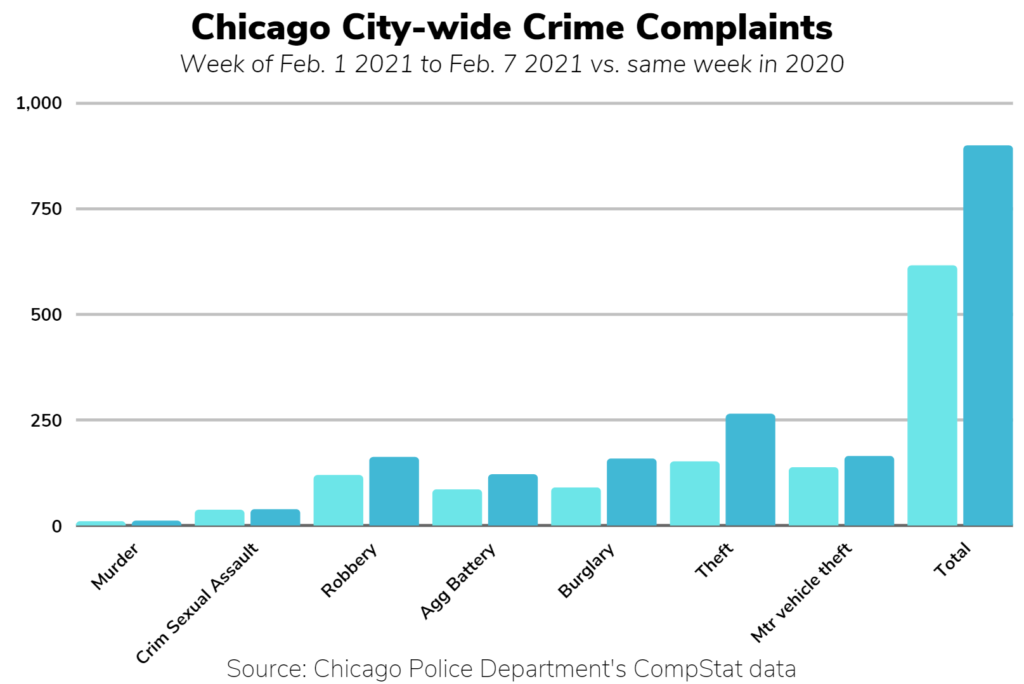
Everything from criminal sexual assaults to aggravated battery and motor vehicle theft declined during that week, according to the latest data from the Chicago Police Department’s (CPD) CompStat figures, which are typically updated every Monday. (Yet, data for the week starting Feb. 8 had not been uploaded as the time of writing this article.)
From a five-year, year-to-date, perspective too, things appear to be on the mend. At least, as we mentioned, on the face of it.
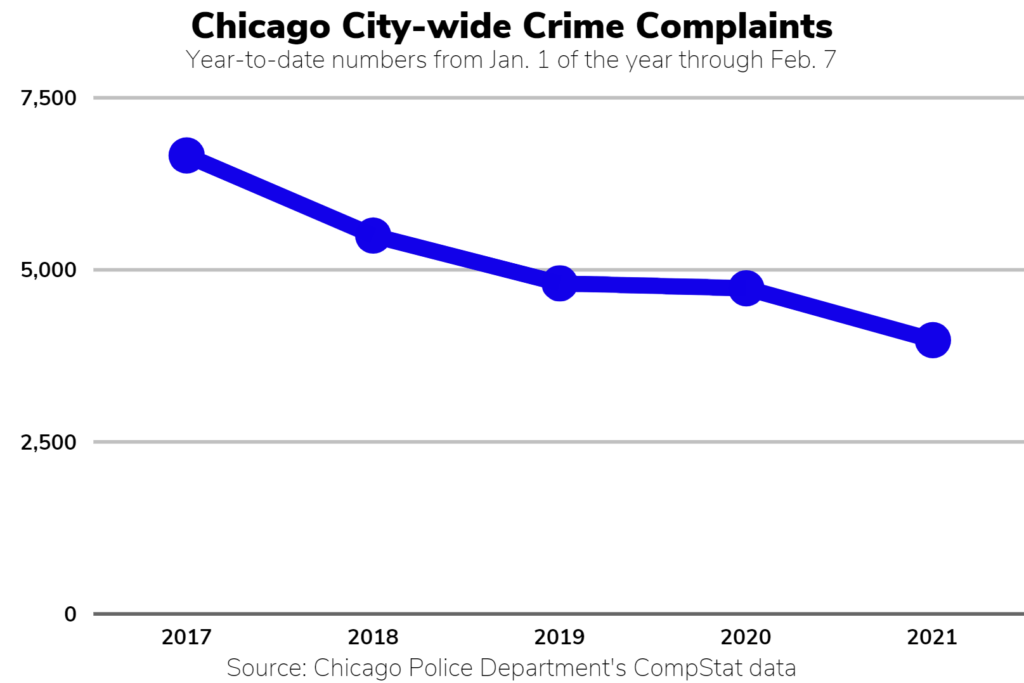
The Story Behind The “Good” Numbers May Be Different
The picture changes, though, when the various categories of crime are studied independently, as with reports of shooting incidents, for instance.
Shooting incidents were up 28% on a 28-day basis, leading up to Feb. 7, 2021. In that same 28-day period, motor vehicle thefts also increased by 18% and robbery went up 3%.
Motor vehicle thefts have been on the rise only over the past two years and there has been no clear trend yet for robberies, according to CPD data. But shooting incidents have displayed an alarming upward trend for the past three years now, and that continued into this February.
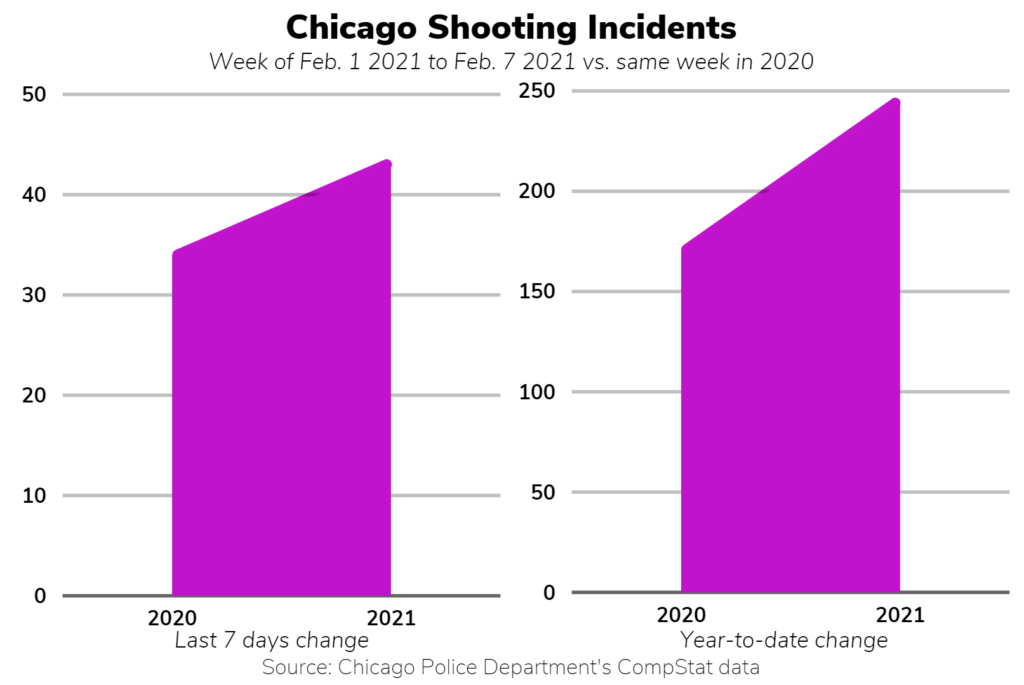
Chicago’s Bloody Timeline, A Rise, Fall And Rise Again
The 1960s were, perhaps, one of the most crucial decades in the history of Chicago’s violent streak. It was marked by turbulent change and the number of homicides nearly doubled from the start of the decade to its end, according to an excellent Chicago Tribune article from last year, which traced 63 years of murder in the city.
Here’s our quick recap of the Tribune article, but we’d urge you to read it in its entirety: In the 1970s, the city witnessed 970 homicides in one of its bloodiest years ever. A nationwide economic recession and unemployment exacerbated the murder rates, even as “super gangs” competed with each other over the drug markets. The 80s were slightly better than the 90s but overall, homicides still remained high.
With the advent of crack cocaine, homicides soared in the 1990s. Territorial wars among gangs, made worse by the city’s demolition drive of its high-rise public housing projects, which displaced people, was reportedly the main reason for gang violence during this decade. Chicago had the highest number of homicides in the country in the early part of the 2000s, though numbers continued to fall from the highs of the 1990s.
The early part of the next decade, the 2010s, was promising and had some of the lowest homicide totals in decades. But violence exploded in 2016 with 760 killings. The number of homicides has fallen since the 2016 spike, with decreases between 2017 and 2019. But 2020, a year that saw a potent, poisonous mix of the pandemic, rising unemployment, anti-police protests, lockdowns, isolation and mental health issues, was a tough year, once again.
There were 774 murders in the city in 2020, a 50% increase from 506 in 2019, according to an excellent database maintained by the Chicago Sun-Times.
Highest January Murder Rate In Four Years
Although overall crime rates may be falling in Chicago of late, one category is dramatically different when viewed at from a year-to-date perspective — murders. Chicago clocked its highest January murder rate in four years in 2021.
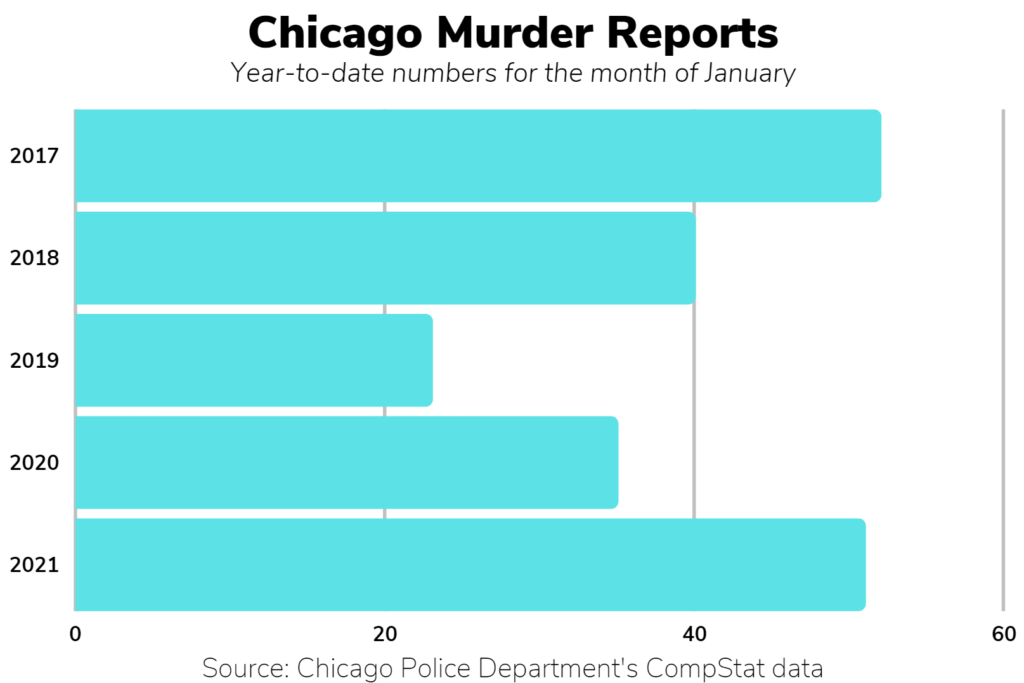
According to the the CPD, January 2021 saw 51 homicides. The Sun-Times database has that at number at 54, but the CPD count does not include homicides on expressways nor killings committed in self-defense. Either way, it was Chicago’s deadliest January in four years.
That trend appears to have continued into February too so far, with the year-to date murder reports standing at 60 for 2021 versus 43 in 2020 as of Feb. 7, according to CPD data.
Of Untold Murders Of Women, And Reforming Cash Bail
If the last two charts weren’t alarming enough, here are a few more aspects of Chicago’s current crime scenario that just may be. Over the past 20 years, over 50 women have been brutally murdered in the city, a WGN9 report says. Their bodies were left in alleys, vacant lots and abandoned houses.
All of the women were strangled or asphyxiated, with some even dismembered and burned. In 2019, the CPD created a task force, made up of FBI and CPD detectives to review the murdered women’s cases. They solved four cases, but the state’s attorney felt charges could only be sustained in one. The fight for justice for Chicago’s women carries on.
In the meantime, a report by Loyola University’s Don Stemen and David Olson was released. The study intended to show that the city’s controversial limits on the use of cash bail did not end up causing more crime, a major worry for sections of law enforcement and bail-reform skeptics. A piece last week in the City-Journal, a publication of the Manhattan Institute for Policy Research (MI), a free-market think tank, said as much in an article titled, “Yes, Bail Reform in Chicago Has Increased Crime.”
But Cook County Circuit Court Chief Judge Timothy Evans has not agreed. In 2017, Judge Evans required that judges not mandate cash bail unless strong reason existed to do so. It was a move aimed at reducing the number of offenders being held only because they could not afford to get out. Cook County Courts later published a report that said the order had reduced the jail population, without causing crime to rise.
Stemen and Olson’s report showed that bail reform led to the release of roughly 500 defendants who would otherwise have been detained. The report had estimated that, both before and after reform, roughly 17% of released offenders committed a new crime, including 3% who committed a violent offense.
The City-Journal’s contention was that if 500 additional people were released under the order, and the same share (17%) of released individuals reoffended, then the total number of crimes in Chicago would necessarily rise.
There is no question that money bail, as a system, has a worse impact on poor and minority defendants pretrial, and on jail populations generally. But we also have the statistics that show more recent spikes in crime. For instance, a sharp spike in the number of carjacking incidents reported in the city. There was a 17% increase in motor vehicle theft complaints in the 28 days leading up to and through Feb.7, according to CPD data.
Carjackings have been surging in Chicago for more than a year, a post in Block Club Chicago, an online newspaper that reports local and neighborhood news in the city, said on Jan. 22. After a 135% jump in 2020, the trend is continuing with 144 carjackings reported in the first 20 days of 2021, the report added.
The Block Club post also spoke about Stephanie Martin, who had lived in the Calumet Heights neighborhood all her life, but told members of the City Council that she was contemplating moving out of the city. On Dec. 1, 2020, her 31-year-old son was the victim of an attempted carjacking and robbery that left him paralyzed, she said.
And Then, As Always, There Are Guns, And People With Guns
“In response to the COVID-19 pandemic, the law department has temporarily halted the prosecution of gun-registry offenses.”
A spokesperson for Chicago Mayor Lightfoot’s administration to the Chicago Sun-Times, when asked to comment on why the administration nearly always asked judges to dismiss charges in cases involving gun-registry violations
In another recent development, although Chicago requires convicted gun criminals to register and punishes those that fail to comply, it has not been doing so in response to the Covid-19 pandemic according to a Chicago Sun-Times article. The law requires anyone convicted of gun-related violence or illegal gun possession to go to police headquarters yearly and register their home addresses.
The article says its own analysis that found most cases of those failing to comply get dismissed in court — and that’s typically done at the request of lawyers representing City Hall. The gun-offender registry was established under then-Mayor Rahm Emanuel in 2013. The aim was to alert the police to use extra caution when approaching any suspect the police department’s arrest database shows is in the registry.
It was modeled along the lines of similar programs in Baltimore and New York, two other cities with gun offender issues. Baltimore officials had told the Washington Post in 2012 that their gun-offender registry helped reduce crime, with fewer than 5% of the 1,669 people on the list ending up being arrested on new gun charges.
Asked why lawyers for the city nearly always asked judges to dismiss charges in cases involving gun-registry violations, a spokesman for current Mayor Lori Lightfoot’s law department, responding by email told the Sun-Times: “In response to the COVID-19 pandemic, the law department has temporarily halted the prosecution of gun-registry offenses.”
All things considered, there appears to be a mountain-load of work ahead, for the city, its people, its disparate communities, and its agencies, before the Windy City can finally begin to cast off “the Chicago way” image.
In closing, we leave you with this link to a page managed and updated by the fine journalists at the Sun-Times — a database listing details of every single victim who was killed by another person within city limits. In honor of the fallen.